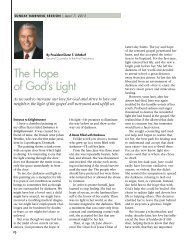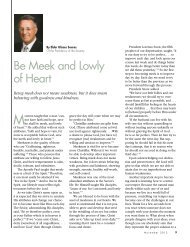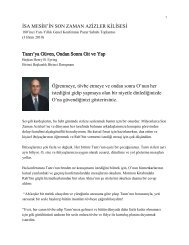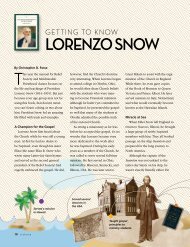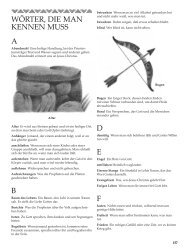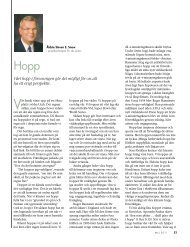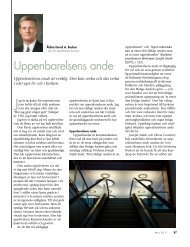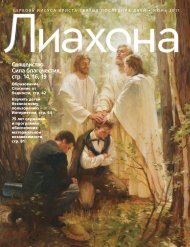February 2012 Ensign - The Church of Jesus Christ of Latter-day ...
February 2012 Ensign - The Church of Jesus Christ of Latter-day ...
February 2012 Ensign - The Church of Jesus Christ of Latter-day ...
You also want an ePaper? Increase the reach of your titles
YUMPU automatically turns print PDFs into web optimized ePapers that Google loves.
death, according to the captivity and power <strong>of</strong> the devil”<br />
(2 Nephi 2:27; see also 2 Nephi 10:23). We cannot choose<br />
the consequences <strong>of</strong> our decisions; if we choose the wrong<br />
and do not repent, we cannot expect to have “liberty and<br />
eternal life.”<br />
Why Do We Need Moral Agency?<br />
On a personal level, one reason we need moral agency<br />
is that the act <strong>of</strong> choosing good dramatically changes the<br />
quality <strong>of</strong> our lives and the lives <strong>of</strong> those we love. “When<br />
we follow the prophets’ counsel to hold family home evening,<br />
family prayer, and family scripture study, our homes<br />
become an incubator for our children’s spiritual growth,”<br />
taught Elder Robert D. Hales <strong>of</strong> the Quorum <strong>of</strong> the Twelve<br />
Apostles. “<strong>The</strong>re we teach them the gospel, bear our testimonies,<br />
express our love, and listen as they share their feelings<br />
and experiences. By our righteous choices and actions,<br />
we liberate them from darkness by increasing their ability to<br />
walk in the light.” 2 Agency is essential to our happiness as<br />
individuals and families.<br />
Moral agency also is important in our striving to become<br />
like the Savior and Heavenly Father. Elder Dallin H. Oaks<br />
<strong>of</strong> the Quorum <strong>of</strong> the Twelve wrote, “<strong>The</strong> commandments,<br />
ordinances, and covenants <strong>of</strong> the gospel are not a list <strong>of</strong><br />
deposits required to be made in some heavenly account.<br />
<strong>The</strong> gospel <strong>of</strong> <strong>Jesus</strong> <strong>Christ</strong> is a plan that shows us how to<br />
become what our Heavenly Father desires us to become.<br />
. . . This spotless and perfected state will result from a<br />
steady succession <strong>of</strong> covenants, ordinances, and actions,<br />
an accumulation <strong>of</strong> right choices, and from continuing<br />
repentance.” 3 <strong>The</strong> moral decisions we make in this life—<br />
and how we act on them—matter.<br />
Moral Agency and the Plan <strong>of</strong> Salvation<br />
Another reason we need moral agency is because <strong>of</strong><br />
the fundamental role it plays in the plan <strong>of</strong> salvation. As<br />
Elder Hales has taught, “Agency is essential to the plan<br />
<strong>of</strong> salvation. . . . Without agency we would be unable to<br />
make right choices and progress.” 4 Agency is so important<br />
to Heavenly Father’s plan that in the premortal life,<br />
54 <strong>Ensign</strong><br />
Lucifer “sought to destroy the agency <strong>of</strong> man” (Moses<br />
4:3). Elder D. Todd <strong>Christ</strong><strong>of</strong>ferson <strong>of</strong> the Quorum <strong>of</strong> the<br />
Twelve wrote about three elements <strong>of</strong> moral agency as<br />
found in 2 Nephi: alternatives among which to choose,<br />
knowledge, and freedom to make choices. 5<br />
Alternatives. Lehi taught that there must be “an opposition<br />
in all things.” Without such opposition, “righteousness<br />
could not be brought to pass, neither wickedness, neither<br />
holiness nor misery, neither good nor bad.” Everything<br />
would be “a compound in one; wherefore, if it should be<br />
one body it must needs remain as dead, having no life<br />
neither death, nor corruption nor incorruption, happiness<br />
nor misery, neither sense nor insensibility” (2 Nephi 2:11).<br />
Thus, opposition and the alternatives that come with it are<br />
essential characteristics <strong>of</strong> our existence, for if there were<br />
no opposition and no alternatives from which to choose,<br />
there would be no agency, and the “wisdom <strong>of</strong> God and<br />
his eternal purposes,” as well as His “power,” “mercy,” and<br />
“justice,” would be destroyed (2 Nephi 2:12).<br />
Expanding on the concept <strong>of</strong> opposition, Lehi explained<br />
the consequences <strong>of</strong> having no law: without law, there<br />
would be no sin, which would mean there would be no<br />
righteousness nor happiness. Without righteousness and<br />
happiness, there would be no punishment nor misery. (See<br />
verse 13.) <strong>The</strong>n Lehi taught us the ultimate consequence<br />
<strong>of</strong> there being no opposites: “If these things are not there<br />
is no God. And if there is no God we are not, neither the<br />
earth; for there could have been no creation <strong>of</strong> things, neither<br />
to act nor to be acted upon; wherefore, all things must<br />
have vanished away” (2 Nephi 2:13).<br />
In other words, without opposition, there could be no<br />
life! Opposition is essential to the plan <strong>of</strong> salvation.<br />
Knowledge. Elder <strong>Christ</strong><strong>of</strong>ferson taught that “for us to<br />
have agency, we must not only have alternatives, but we<br />
must also know what they are.” Otherwise, “the existence<br />
<strong>of</strong> those choices is meaningless to us.” 6 Because <strong>of</strong> the<br />
Fall, wrote Elder <strong>Christ</strong><strong>of</strong>ferson, we have “sufficient knowledge<br />
and understanding to be enticed by good and evil—<br />
we attain a state <strong>of</strong> accountability and can recognize the<br />
alternatives before us.” 7 If it weren’t for our knowledge <strong>of</strong>



